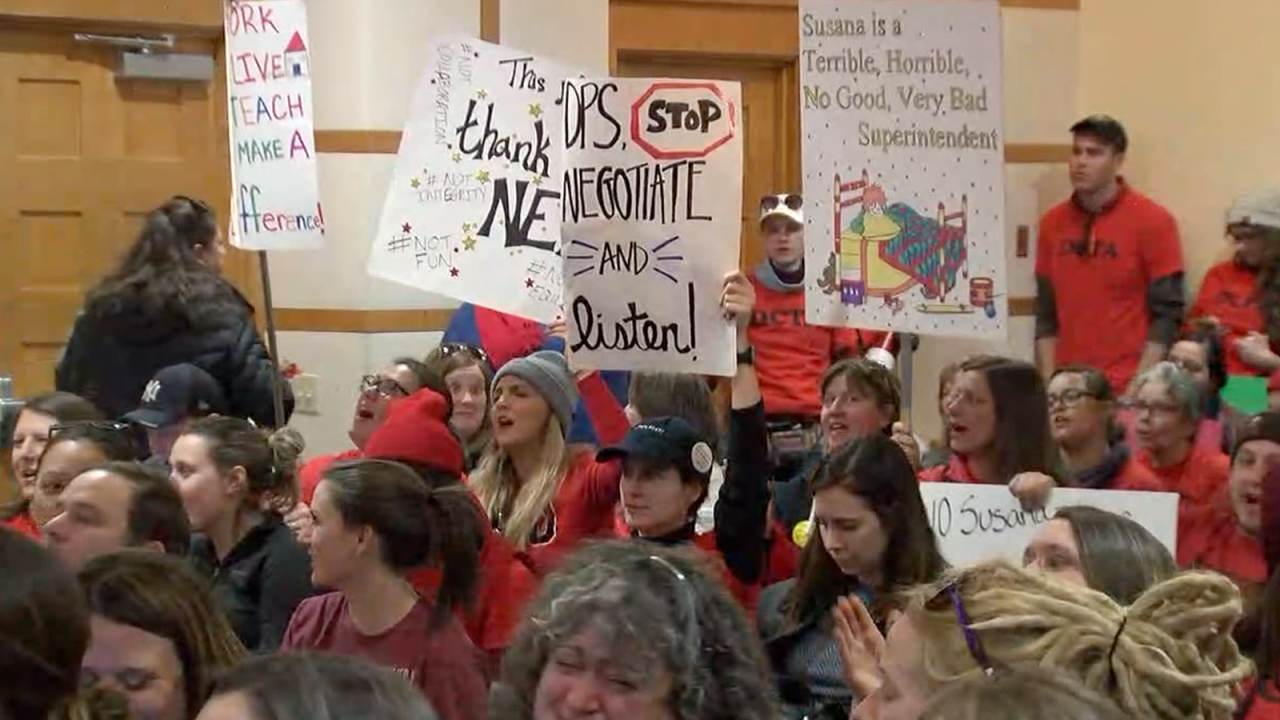DENVER — It was just 16 months ago that Denver Public School teachers went on strike and won a hard fought pay raise.
Now, they're being asked to give it up because of massive budget problems related to the COVID-19 pandemic.
The pandemic, and related economic closure, led to a $3.3 billion shortfall in the State's FY 2020-21 budget, which prompted the Joint Budget Committee of the State Legislature to propose cutting 15 percent, or $724 million from the state's K-12 education budget.
In a letter to DCTA President Tiffany Choi, DPS Superintendent Susana Cordova said that will result in a $65 million gap in the district's budget for next year.
Cordova is requesting that the DCTA sit down with the district and revisit salary and benefits for the coming year.
"While it was the intent of the Denver Public Schools to comply with the economic provisions as contemplated by the agreement, we must take this step to address this unprecedented budgetary shortfall," Cordova wrote. "We are seeking to work collaboratively with the DCTA to find a solution that addresses the unprecedented revenue shortfall in a way that is aligned with our principles and values. To that end, we ask for your availability to negotiate the 2020-21 financial agreements."
Choi sent a statement to Denver7 saying, "DCTA recognizes that in the wake of a pandemic and economic crisis, everyone will need to make sacrifices, and we are willing to go to the bargaining table to have this discussion about what is best for our students. It is unfortunate that DPS so far has only proposed using $10 million of the Cares Act money and no reserves money to cover the budget shortfall for next year.
Many parents, who were supportive of the teacher's strike, say the district needs to find somewhere else to cut.
One told Denver7 off camera that the only reason her children made it through the last semester of "online" learning is because of hard working teachers.
Savrina Guevara-Garcia said she struggled, as a parent, to cope with the realities of the pandemic and the online learning system.
"Honestly, I don't think I could be a teacher," she said. "It was, excuse me, but it was hell trying to get these kids up, get em moving, and get em going."
It's not just DPS that is struggling.
The Douglas County School District is projecting a budget deficit of $30 million for the 2020-21 school year.
During the last Board meeting, department leaders provided examples of budget cuts and the impact those cuts would have on departments and the district.
"The budget process is very fluid and that is especially true this year," said DCSD spokeswoman Paula Hans.
Jefferson County Public School's revenue will decrease by $30.6 million (after a $3.4 million pass-through to charters, preschool and innovation schools,) as a result of the Colorado School Finance Act.
The district is still in negotiations with both the Jefferson County Education Association and the Jeffco Education Support Professionals Association.
A district spokeswoman said the teams have monitored and will continue to monitor the financial landscape, with the intention to use the clarity in the adopted budget to proceed to compensation discussions. The teams will work this summer to finalize agreements.
Going forward, there are many unknowns that may result in revisions to this adopted budget in the fall, including actual cost to restart school, official enrollment, recissions from the state, Gallagher Amendment impacts, and continued COVID-19-related closures. In addition, reductions will be needed in the absence of continued funding supports from the government, like the CARES Act, in sequential years should the health crisis continue.
Cherry Creek Schools are also confronting a major deficit.
Supt. Scott Siegfried said in a statement, "I want to be clear and transparent with our community. A $60 million budget deficit will require more sacrifice and more cuts than we saw with the Great Recession and it is a threat to our ability to deliver on our promise of excellence for every student, every day."
Siegfried added that a worst-case scenario would result in a reduction of teachers and staff.
"Class sizes would be increased and programs will be eliminated or drastically cut," he said. "The Cherry Creek School District will not resemble the district we have known for 70 years."
He said, in addition to a salary freeze for all staff that takes effect July 1 of this year, all Cherry Creek School District employees will have to take furlough days throughout this year and possibly see a reduction in salary in the future.
Carlye Holladay, the Cherry Creek Education Association's Vice President-Elect, said, "I'm worried about what we're going to do and how we're going to be able to manage this without hurting students. The reality is, I don't know that that's possible without more revenue."
Holladay said it's going to take much more than furlough days to fix the problem.
"If the entire district took a furlough day and didn't come to work, that would save us 2.6 million... so that's a lot of furlough days to fill a 60 million dollar hole," she said.
She said the district might be able to go to voters and ask for help, but she said a mill levy override only get's us "halfway."
"What we need," she said, "is for the state to fully fund education."


